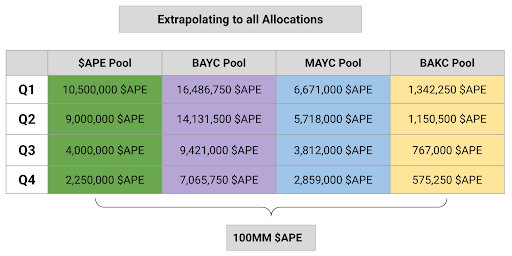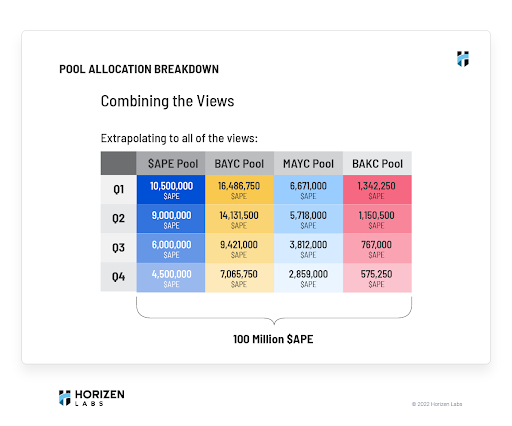
FREQUENTLY ASKED QUESTIONS
ApeStake.io is the official staking protocol for ApeCoin ($APE) established by the ApeCoin DAO (ApeDAO) and was created as a way for $APE, BAYC, MAYC, and BAKC holders to earn rewards through staking. $APE can be staked by itself or in conjunction with a BAYC, MAYC, or BAKC in one of the four staking pools, with each pool offering different levels of rewards.
The ApeStake.io protocol was proposed in AIPs 21 and 22 and subsequently approved by the community on May 4, 2022. Following approval, the Ape Foundation enlisted Horizen Labs to provide a platform for the staking protocol according to the specifications set forth in the AIPs.
To help clarify terminology, the AIPs provided definitions for some important terms:
Staking Pools: The total ApeCoin pools that participants can earn from.
Staking Pool Type: The pool is specifically assigned to a digital asset class; there are four in total.
Staking Period: Each period is 12 months.
Staking Pool Allocations: The total amount of ApeCoin allocated to each Staking Pool Type per period.
Total Staking Period: A total of three (3) years.
Initial Staking Period: The first 12-month period of staking.
Pool Distribution: The spread of the staking allocation assigned across the period.
Incentive Distribution Curve: The schedule of ApeCoin allocated for incentives per quarter.
ApeStake.io allows holders of $APE to put their idle tokens to work by staking them within various pools and earning additional rewards in the form of more $APE.
ApeStake.io is more than just a simple staking protocol. It has the distinction of offering layers of rewards for holders of certain NFTs. Operating like a safe-deposit box key, these NFTs grant holders access to exclusive staking pools.
Below is a breakdown of the four staking pools and their total allocations as specified in AIP 22 for Year 1:
$APE Staking Pool: 30,000,000 $APE Tokens
BAYC Staking Pool: 47,105,000 $APE Tokens
MAYC Staking Pool: 19,060,000 $APE Tokens
BAKC Staking Pool: 3,835,000 $APE Tokens
No, there are no lock up periods. You can add and remove $APE to any of the available pools at any given time.
When a user deposits ApeCoin, the staking smart contract must transfer tokens out of the user's wallet and into the contract itself. This action cannot be taken unless the user grants specific permission.
This action will modify the state of the ApeCoin ERC-20 contract, which is why it will incur a small gas fee. See here for more details about ERC-20 allowance
WE STRONGLY RECOMMEND THAT YOU UNCOMMIT YOUR BAYC, MAYC, OR BAKC PRIOR TO THE SALE.
If I sell my NFT while it is committed in a BAYC or MAYC pool, will I lose all of my staked $APE?
YES, YOU WILL LOSE YOUR STAKED $APE. Think of your BAYC or MAYC like a box that holds your $APE. If you sell the box, the new owner gets the box plus all of its contents. So, if you’re about to sell your BAYC or MAYC, WE STRONGLY RECOMMEND THAT YOU UNCOMMIT YOUR NFT PRIOR TO THE SALE. This will ensure a clean deposit into your wallet of both your staked and earned rewards. If you happen to sell your NFT and forget to uncommit it, the new owner has the ability to uncommit it, and as the NFT is transferred to the new owner, so too will transfer your staked $APE and rewards.
If I sell my NFT while it is committed in a Paired pool, will I lose all of my staked $APE?
Similarly, new owners will have rights to the staked position, with a few caveats.WE STRONGLY RECOMMEND THAT YOU UNCOMMIT YOUR NFTs PRIOR TO THE SALE.
For the Paired Pool, the owner of the BAYC or MAYC is entitled to the staked amount, whereas the owner of the BAKC is entitled to any unclaimed rewards associated with the staking position.
Due to the current regulatory uncertainty surrounding reward pools, ApeStake.io is not available within the United States or Canada. We’re actively tracking new legislation and regulatory guidance as it’s released, and as soon as we can make ApeStake.io available to U.S. and Canadian residents in a legally compliant way, we will do so.
Other countries where ApeStake.io is unavailable include:
North Korea
Syria
Iran
Cuba
Russia
in Ukraine: Donetsk, Luhansk, and Crimea
ApeCoin (trading symbol: $APE) is the official token of the ApeCoin DAO (ApeDAO) and was created as a way to expand the Bored Ape Community by offering new avenues of participation beyond simply buying, owning, and trading BAYC, MAYC, or BAKC NFTs. Holders of $APE may issue and vote on proposals designed to improve the value and utility of the Ape ecosystem.
Without getting too technical, $APE is an ERC-20 governance and utility token of the Ape ecosystem. The ApeCoin website sums up the DAO’s responsibility like this:
The ApeCoin community governs itself via the ApeCoin DAO, the decentralized governance framework that supports the Ecosystem Fund. The DAO follows a proposal process to vote on how the Ecosystem Fund will be distributed by the APE Foundation to promote a diverse and self-sustaining ecosystem.
There are various centralized exchanges that can be used to buy $APE such as Coinbase, Binance, and many others. In order to use it for staking, you will need to transfer the $APE that was purchased on a centralized exchange to a crypto wallet. We support Metamask as well as any wallet that is supported by Wallet Connect.
Please use the following User Guide which will walk you through the staking process.
We allow integration with hardware wallets via Metamask and Wallet Connect. Note that in order to process a transaction with your hardware wallet, you will need to approve the transaction on the device it is connected to. Your transaction will remain pending until you do so.
We only support staking $APE from the browser within the Metamask native application. If you are having difficulty using this, we recommend using a desktop device.
Plenty. AIP 22 was specific in detailing the pace at which the different staking pools distribute rewards, though the rate varies depending on how much $APE is staked at any given time across the four pools. Also worth noting, ApeDAO reserves the right to change the staking allocation at any time. The table below illustrates this:
Without getting too technical, $APE is an ERC-20 governance and utility token of the Ape ecosystem. The ApeCoin website sums up the DAO’s responsibility like this:

The Total Amount Staked is the total $APE that is currently being staked in a given pool by its users. The Allocated Amount is the amount of $APE that will be given to users who participate in the pool for a given period of time. These amounts are not related.
Bored Ape Yacht Club
Launched in April 2021 by Yuga Labs, the Bored Ape Yacht Club (BAYC) is a collection of 10,000 NFTs. These unique digital collectibles live on the Ethereum blockchain and represent the most successful NFT collection in history, with sales of individual NFTs reaching $2.3 million dollars at auction. The collection gave rise to a thriving community of Ape NFT enthusiasts.
Bored Ape Kennel Club
Shortly after the launch of the BAYC collection, Yuga Labs launched the Bored Ape Kennel Club in June 2021, an NFT collection of 9,602 unique dogs, which were not available for sale but rather only offered to those who held a Bored Ape NFT in a wallet. The collection was intended to serve as companions to the original Bored Apes.
Mutant Ape Yacht Club
In August 2022, Yuga Labs launched its third NFT collection, the Mutant Ape Yacht Club (MAYC) a popular offshoot of BAYC and BAKC. 20,000 MAYCs were issued with half being auctioned off while the other half were allocated to the holders of Bored Apes.
All three NFT collections leverage the widespread ERC-721 token standard employed by the Ethereum blockchain. And just in case you’re new to this crypto stuff, NFTs are unique digital tokens that can be used to prove ownership of an asset or item. This can include a work of digital art, a document, or a digital title.
No. Any $APE holder can stake their $APE and accumulate rewards. In fact, all staking on the ApeStake.io site consists of staking actual $APE. It’s only the presence of an NFT in a wallet that provides holders with access into different staking pools and reward levels.
Here’s what AIP 22 has to say about the fluctuating value of staked assets:
The Staking Pool Allocations for Staking Periods following the Initial Staking Period will be determined by the market prices of the BAYC, MAYC, and BAKC NFTs. An average price during Q4 of the previous Staking Period will determine the ratio allocated to each of the Staking Pool types. The $APE Staking Pool will remain constant at 30%. Note: The BAKC Staking pool can only be utilized if a BAKC NFT is being paired 1:1 with a BAYC or MAYC NFT.
As an example, the chart below provides a visual representation of the staking values for Year 1:

All staking protocols come with some measure of risk and none are 100% secure.
To help mitigate these risks, Horizen Labs has gone to great lengths to protect your staked tokens with measures that include:
Smart Contract Audit: The smart contract developed by Horizen Labs has been audited by the security firm Halborn and the audit report can be found here.
Again, in spite of these measures, risks of staking on ApeStake.io exist. These risks could include but are not limited to events like:
Forfeiture of Tokens
When you stake tokens, they technically move outside of your control and become part of the block forging rewards mechanism. While security measures have been implemented, there remains a non-zero risk that staked tokens may be vulnerable to hacks or undiscovered bugs, which could lead to a total loss of your tokens.
Smart Contract Security
Code is written by humans, so naturally there is an ever-present risk that ApeStake.io could contain a smart contract vulnerability or bug. ApeStake.io’s code is open-sourced and audited by Halborn, crypto’s leading security auditing company.
NFT Transfers of Ownership
See FAQ question: “What happens when I sell my NFT while it is committed?”
The only fees that apply are normal transaction gas fees on the Ethereum network.
APE Improvement Proposals (AIPs) number 21 and 22 were submitted by giacolmo.eth and approved by the Ape Community on May 4, 2022. Here are some additional details from the AIP:
Community Forum
The ApeCoin community governs itself via the ApeCoin DAO, the decentralized governance framework that supports the Ecosystem Fund. The DAO follows a proposal process to vote on how the Ecosystem Fund will be distributed by the APE Foundation to promote a diverse and self-sustaining ecosystem.
AIP 21
This AIP proposes a staking system for ApeCoin and the Bored Ape Yacht Club (BAYC) NFT ecosystem. See full proposal for AIP 21.
AIP 22
This proposal presents the total ApeCoin allocation for the staking pools and the three-year duration of this staking period. See full proposal for AIP 21.